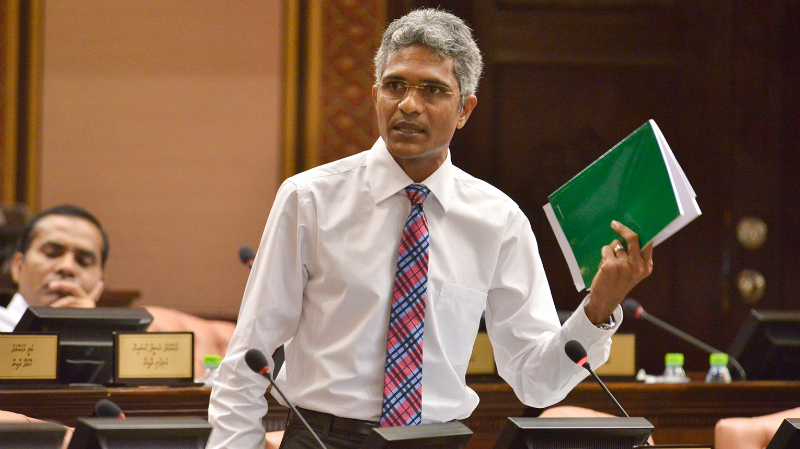The government has proposed revisions to the Civil Service Act that would allow civil servants to campaign for public office without resigning from their jobs.
“If these amendments are passed, our civil service employees would be able to campaign for elected posts while remaining in their jobs and have the opportunity contest elections,” explained Progressive Party of Maldives (PPM) MP Mohamed Ameeth Ahmed Manik at today’s sitting of the People’s Majlis.
Presenting the legislation (Dhivehi) on behalf of the government, the MP for Raa Madduvari explained that the amendments to the 2007 law were part of a raft of bills proposed by the government to bring outdated laws in line with the new constitution adopted in August 2008.
Opposition MPs have expressed concern that the changes may lead to the politicisation of the civil service, which currently employs just under 25,000 Maldivians – over 7 percent of the population.
Ameeth meanwhile noted that the Supreme Court had ruled Article 53 of the act was unconstitutional.
In September 2011, the Supreme Court backed a ruling against the prevention of civil servants’ participation in political activities.
The courts referred to Article 30(a) of the Constitution, which states, “Every citizen has the right to establish and to participate in the activities of political parties.”
The case was filed at High Court in late 2008 by Mohamed Hanim, who was demoted from his post as director general at the Ministry of Youth and Sports after he spoke at a campaign rally of the then-opposition Dhivehi Rayyithunge Party.
Ameeth noted today, however, that the revisions would establish boundaries for civil servants who wish to be active in politics.
The amendments would prohibit civil servants from using powers to directly or indirectly influence political activities as well as participating in political activity either during official working hours or in a way that casts doubt on impartiality in the performance of duties.
Additionally, civil servants would be prohibited from filling any post in a political party or submitting a form to register a political party.
The restrictions were necessary to ensure that the civil service was free of political bias and undue influence, Ameeth said.
The amendments also stipulate that political appointees, judges, employees at state-owned enterprises, soldiers, and staff at the judiciary and parliament would not be considered civil servants.
Article 77(d) of the Civil Service Act – which prohibits campaigning for public office – would meanwhile be abolished.
Despite Ameeth’s claims, however, the bill does not propose abolishing Article 51 of the act, which stipulates that civil servants must resign six months ahead of contesting an election.
Conceding that the draft legislation could have shortcomings, Ameeth appealed for MPs to offer “constructive” criticism and noted that stakeholders could be consulted at the committee stage to address concerns of civil servants.
Debate
In the ensuing debate, opposition Maldivian Democratic Party (MDP) MP Ali Azim alleged that the main purpose of the bill was to “force all civil servants to join PPM.”
He further claimed that employees hired for government-owned corporations were forced to sign PPM membership forms.
MDP MP Abdulla Shahid – former speaker of parliament – contended that the amendments would return civil servants to the “enslavement” of the years before 2007, warning that it could be used to dismiss large numbers of civil servants.
Civil servants could be fired if they refuse to attend “certain rallies” or put up campaign posters, he claimed.
MDP MP ‘Reeko’ Moosa Manik meanwhile called on the government to set a minimum wage of MVR4,500 (US$292) a month for civil servants.
Statistics published by the Civil Service Commission in June showed an estimated 40 percent of civil servants are paid less than MVR4,999 (US$324) per month.
MDP MP Mariya Ahmed Didi noted that current President Abdulla Yameen – who resigned from the government and formed the People’s Alliance party in 2008 – had backed the legislation in the 16th parliament (2003-2008).
The prohibitions in the law were intended to establish a “professional civil service” and ensure “institutional memory,” she said.
Civil servants would have an undue advantage over other candidates since they could misuse their authority, she suggested.
Majority Leader Ahmed Nihan, however, insisted that former President Maumoon Abdul Gayoom deserved “full credit” for creating an independent civil service.
The present administration also deserved gratitude and praise from civil servants for ensuring the right to participate in political activity, he added.
MP Ahmed Amir of the Maldives Development Alliance (MDA) – coalition partner of the ruling PPM – meanwhile suggested seeking advice from the Supreme Court when the legislation is reviewed by committee.
While the amendments prohibit civil servants from being a signatory to a request to form a political party, Amir noted that the constitution guarantees the right to form political parties to all citizens.
PPM MP Abdulla Rifau said it was “regrettable” that parliament had not amended the law in light of the Supreme Court ruling.
The PPM government would ensure that civil servants receive a pay rise when the economy improves, he added.
Rifau went on to accuse employees in the health sector of “pestering” the government with politically motivated acts of sabotage.
Likes (2)Dislikes
(2)Dislikes (0)
(0) 